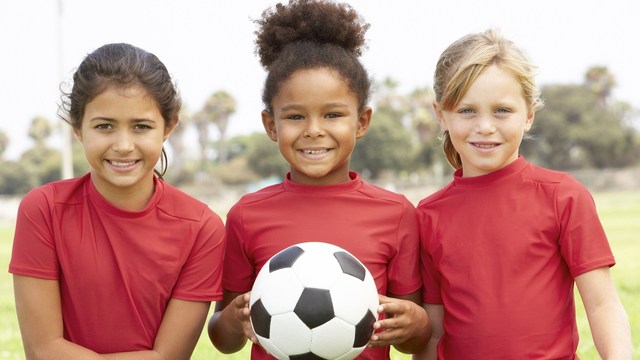 MonkeyBusiness Images/PhotoSpin
MonkeyBusiness Images/PhotoSpin
An Increasing and Disturbing Trend
The current upward trend of changing the focus of family, school and extracurricular activities to having fun rather than outcome is setting children up. Our children can emerge from this scenario with a sense of entitlement and a lack of ambition or drive to persevere and persist until they reach a goal. After all, if everyone gets a blue ribbon just for showing up, why strive to do anything but show up? (1, 3)
Sense of Entitlement versus Sense of Responsibility
We are creating a generation of children who do not know what it is like to take responsibility for a mistake they’ve made because parents jump in at the first sign of catastrophe to save their child the embarrassment. This is called overparenting. (4, 6)
We are creating a generation of children who do not understand the word “No.” We are creating a generation of children who have no sense of competition, who are taught that competition is bad. We are quashing any inkling of a desire in children to even improve themselves and strive to be better.
Like in the movie "Finding Nemo" where the father tries to keep anything bad from happening to his son, we think by protecting them we’re preserving a child’s self-esteem, but in reality we’re keeping them from building some. (4)
Self-esteem, belief in ourselves, can only come when we set a goal and achieve it. If that sense of competition that comes naturally to children is restricted too much, then children may never want to strive to be anything more than who they already are. They may never try to surpass their current abilities and how they already do things. We’ve lowered the bar to make sure everybody fits but we’re stifling everybody.
And children who are handed everything they ask for aren’t learning to be thankful for anything. For these children, there is no appreciation for hard work, sacrifice and determination. (6)
Some schools are going so far as to remove soccer balls from soccer games and practices because it incites competition, or have children stand at home plate and talk about and point to where they would like to hit the ball and then run to the appropriate base.
Every kid sings in the choir, even though some would rather die or can’t hold a tune and can be teased by other choir members.
Some sports organizations stop counting score ... but the kids haven't. They know very well who’s scored more goals.
Parents and schools are going to extreme lengths to make sure everyone has a chance and everyone participates and is rewarded for putting in their best effort regardless of the outcome — and this kind of learning has a place. (6)
Where this kind of thinking — that everybody is equal and has the same skills and same abilities and even the same interests — is inherently wrong is that we are actually all different.
Some students will excel in sciences, some students will excel in English. Some students will turn out to be brilliant goaltenders whether in hockey, soccer or other sport. Some excel in expressing their individualism through arts — music, drawing, painting, sculpting, public speaking or writing.
Kids Need to Learn that Loss is a Part of Life
I think on a logical basis, we as adults know this and I think the drive behind this “celebration of mediocrity” is to help our kids face life with a positive outlook.
This is not a bad thing, but it also means we're missing out on teaching our children the critical thing — that life is not always going to go the way they want it to, they’re not always going to win, they’re not always going to get what we want. And that’s okay.
Children need to learn how to respond in a positive and proactive way, learn from it so they can do the next step of this life journey better. But the only way these lessons can happen is if they sometimes lose.
They can’t have the mountain-top experiences of success and accomplishment and fulfillment without the valleys of setbacks, challenges and the problem solving skills that some along with those challenges and setbacks.
In my next article Competition helps Build Self-Confidence and Self-Improvement we will continue to look at how kids need to experience loss, defeat and failure to effectively prepare them for life’s circumstances.
Sources:
1. Losing Is Good for You. Merryman, Ashley. New York Times. Web. Accessed: Jan 15, 2014.
http://www.nytimes.com/2013/09/25/opinion/losing-is-good-for-you.html?_r=0
2. Why Parents Need to Let Their Children Fail. Lahey, Jessica. The Atlantic. Web. Accessed: Jan 15, 2014.
http://www.theatlantic.com/national/archive/2013/01/why-parents-need-to-let-their-children-fail/272603
3. Why we need to teach our kids how to fail. Lang, Amanda. The Globe and Mail. Web. Accessed: Jan 15, 2014.
http://www.theglobeandmail.com/globe-debate/why-we-need-to-teach-our-kids-how-to-fail/article4104820
4. Can a Parent Do Too Much for Their Child? An Examination By Parenting Professionals of the Concept of Overparenting. Locke, Judith Y, et al. Queensland University of Technology, Australia. Australian Journal of Guidance and Counselling. Volume 22. Issue 2. 2012. Pp. 249-265.
http://journals.cambridge.org/download.php?file=%2FJGC%2FJGC22_02%2FS1037291112000295a.pdf&code=dba61db0c06058acb38b329bcd41b762
5. Why We Should Let Our Kids Fail. Parent Walravens, Samantha. ModernMom. Web. Accessed: Jan 15, 2014.
http://www.modernmom.com/690ff96c-4e3e-11e3-b437-bc764e0546c6.html
6. Why You Should Let Your Child Fail The Benefits of Natural Consequences. Lehman, James. Empowering Parents. Web. Accessed: Jan 15, 2014.
http://www.empoweringparents.com/The-Benefits-of-Natural-Consequences.php#
Reviewed January 16, 2014
by Michele Blacksberg RN
Edited by Jody Smith





Add a Comment1 Comments
Well, no kidding! Wow
January 18, 2014 - 7:22amThis Comment